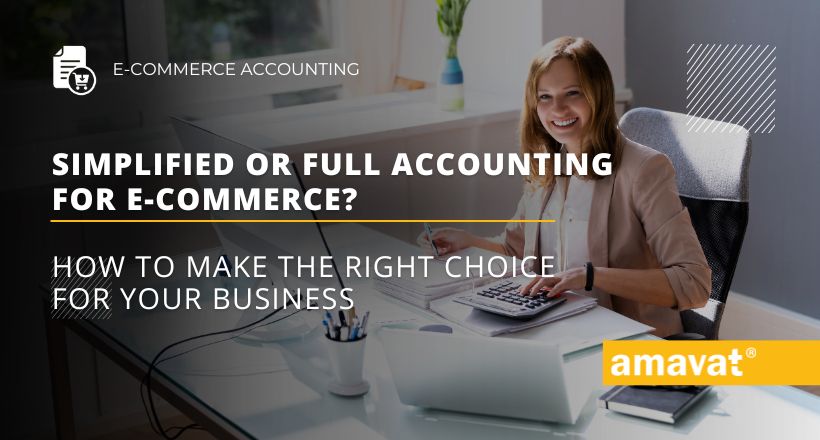Simplified or full accounting for e-commerce? How to make the right choice for your business
Owners of e-commerce businesses and individuals selling products on platforms like Amazon, Allegro, or Etsy must decide which accounting system to choose — simplified or full. This decision is crucial for managing a company’s finances and taxes. Before making a choice, it’s important to understand the differences between these two forms and which one will be better suited for an online business.
Full accounting – precise but complex
Full accounting is a detailed financial recording system that allows for accurate tracking of every aspect of a business’s operations. Companies using full accounting have access to a wide range of information, including data on revenue, costs, assets, liabilities, and employee wages.
Who is required to maintain full accounting? Regulations impose this requirement on individuals, civil partnerships, general partnerships, and professional partnerships that in the previous tax year exceeded a revenue threshold of 2 million euros. If a company surpasses this limit, it must implement full accounting, which involves higher accounting service costs.
Full accounting includes maintaining accounting books, preparing balance sheets, and analyzing financial results, which allows for more precise management of the company. This gives entrepreneurs a complete picture of their financial situation and helps them better plan the future of the business. However, it’s worth remembering that full accounting is a time-consuming and costly task, usually requiring the help of a professional accounting firm.
Simplified accounting – easier and more accessible
As the name suggests, simplified accounting is much easier to manage than full accounting. It is dedicated to smaller companies that meet specific conditions, including a revenue limit of less than 2 million euros. Within simplified accounting, entrepreneurs can choose from several forms of record-keeping, with the most commonly selected being the Tax Book of Revenue and Expenses (KPiR) or a lump-sum on registered income.
KPiR is a tool for recording revenue and expenses that the entrepreneur earns during the year. Unlike full accounting, KPiR only records basic financial transactions, allowing for simpler and cheaper business management. Lump-sum accounting is even more simplified, where only revenue is recorded, and taxes are calculated based on fixed rates depending on the type of activity.
Simplified accounting is often chosen by micro and small businesses because it doesn’t require advanced knowledge or costly accounting services. In many cases, entrepreneurs can manage their records themselves with the help of available accounting software.
When to opt for full accounting?
Although full accounting is more demanding, it has its advantages. It provides a detailed view of the company’s finances, which is invaluable for larger businesses that need to analyze their financial results, investments, and liabilities regularly. For e-commerce companies experiencing rapid growth, full accounting may become a necessity, especially if the business plans to expand or seeks external financing.
Full accounting is also useful for companies with many different income sources, such as selling on multiple platforms, engaging in international operations, or having complex employee structures. In such cases, precise financial control is key to effective management and avoiding tax errors.
Is simplified accounting enough?
Simplified accounting is an ideal solution for smaller e-commerce businesses that are just starting or have stable, predictable revenue. For companies selling their products on a small scale, such as on a single sales platform, a simplified form of record-keeping will be sufficient. It allows for saving time and money while meeting all legal requirements.
However, simplified accounting has its limitations. It doesn’t provide detailed insight into the company’s finances, which could be problematic when the entrepreneur needs more advanced analysis, for example, for tax optimization or preparing for significant expansion.
Which form of accounting to choose?
The choice between full and simplified accounting primarily depends on the scale of operations and future plans. For small e-commerce businesses that are still developing, simplified accounting is usually the best solution. It’s easy to manage and doesn’t generate high costs.
On the other hand, larger companies with higher turnover, complex structures, or expansion plans should consider full accounting. Although it’s a more costly solution, it allows for complete financial control and better tax optimization.
If you need support in choosing the right form of accounting in Poland, amavat® offers a unique, comprehensive range of accounting services, specifically designed for rapidly growing e-commerce businesses across the country. Partnering with us provides a straightforward and transparent path to achieving your business goals. Experience the difference in quality by opting for accounting services tailored to e-commerce, allowing you to focus on growing your company while we take care of your finances: Contact us.
Summary
In conclusion, choosing the appropriate form of accounting for an e-commerce business depends on several factors, such as the scale of operations, type of company, and the need for detailed financial insight. Simplified accounting is beneficial for smaller companies due to its simplicity and lower costs. It allows for easier tax settlement and can be managed independently or with the help of an accounting firm. On the other hand, full accounting, though more demanding and costly, provides a comprehensive financial overview, which can be invaluable for larger businesses or those planning significant growth. It’s essential to carefully analyze your company’s needs and legal obligations to make the best decision.





